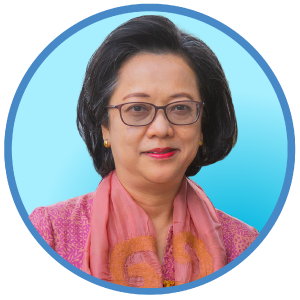Session 1: Shaping a Fair Future: Understanding Future Trends to Achieve Equitable Nation-Building
The world is constantly evolving, and future trends have a profound impact on the dynamics of disparity and nation-building efforts. This session aims to explore emerging trends and their implications for nation-building. It will delve into technological advancements, changing workforce landscapes, environmental challenges, and global interconnectedness. By discussing future trends and their intersection with disparity, this session will enable participants to identify opportunities and develop strategies for equitable and sustainable nation-building.Read More!
- What will the global mega trends be from now to 2025? How will these factors change and impact nation-building?
- How will technological advancements such as automation and AI reshape the workforce and contribute to economic disparity or inclusion? What policies and initiatives are needed to ensure that the benefits of technological advancements are shared by all segments of society?
- How does climate change exacerbate existing disparities and affect vulnerable communities differently? How can nations address environmental disparities and ensure that marginalized communities are not left behind in sustainability efforts?
- What are the trends in geopolitical tensions, and how do they affect disparities and nation-building? What mechanisms and platforms can facilitate meaningful dialogue and exchange between nations to collectively tackle disparity on a global scale?
- Have there been changes in social norms, lifestyle, values, and cultures that impact disparities and nation-building? How do these changes affect disparity and nation-building?
Moderator:

Prof. Dr. Yuosre Badir,
School of Management at Asian Institute of Technology (AIT)
Speakers:

Important points:
- Family and friends remain highly valued: Over 90% of respondents consistently rate family as very important, with friends and leisure time gaining importance.
- Trust levels vary significantly: Scandinavian countries show highest social trust, while other nations have varying trends.
- Gender equality support is increasing: There's a general global trend towards greater support for gender equality.
- National pride trends differ: Some countries like Poland maintain high levels, while others like the US and UK show declining trends.
- Key values for nation building: Tolerance, respect for others, and responsibility are consistently rated as the most important educational values.
1. Prof. Dr. Christian W Haerpfer,
President of the World Values Survey Association,
Director of Institute for Comparative Survey Research, Austria

Important points:
- Persistent regional disparities: Despite development efforts, significant portions of the population still live in extreme poverty with uneven access to quality education.
- Key emerging trends: Rapid technological advancement, climate change, demographic shifts, global interconnectedness, and geopolitical tensions are shaping the region's future.
- Equitable technological benefits: Policies must ensure that technological advancements benefit all societal segments to promote inclusion.
- Changing development assistance: There's a shift towards South-South cooperation and new forms of development assistance, moving away from traditional ODA.
- UN ESCAP's role: The organization is crucial in building intergovernmental consensus and providing country-level support for addressing these challenges.
2. H.E. Prof. Dr. Armida Salsiah Alisjahbana,
Executive Secretary of United Nations Economic and Social Commission for Asia and the Pacific (UNESCAP),
Former Minister for National Development Planning of Indonesia

Important points:
- Increased global defense spending: Military expenditures reached $2.4 trillion in 2023, potentially reducing social welfare budgets.
- Challenges of aging populations: OECD countries projected to have 27% of population aged 65+ by 2050, leading to increased healthcare costs and declining workforces.
- AI's impact on employment: About 25% of jobs could be performed by AI, with office and creative roles most at risk, but manual jobs less vulnerable.
- AI benefits in specific sectors: Potential for more equitable banking, especially in microfinance for developing countries, and optimizing energy consumption.
- Demographic crisis example: South Korea's extremely low birth rate of 0.7 illustrates the severity of demographic challenges in some countries.
3. Mr. Young-Gak Yun,
President of Asia Future Institute, Founder and Group Chairman of Pavilion Investment Group, South Korea

Important points:
- AI's impact on education: Offers benefits like adaptive learning and improved grading, but also presents challenges such as potential cheating and privacy concerns.
- Need for new teaching philosophies: Traditional educational approaches may not suffice in the AI era, requiring integration of AI literacy into curricula.
- Key future competencies: Lifelong learning, creativity using AI, resilience to uncertainty, and human-AI collaboration are crucial skills for the future workforce.
- Smart education strategies: Advocated for transforming linear teaching using technology, emphasizing deep learning and critical thinking skills.
- Balancing technology and learning sciences: Proposed finding an equilibrium between leveraging technology and maintaining core educational principles.
4. Prof. Huang Ronghuai,
Co-Dean of Smart Learning Institute of Beijing Normal University, Director of National Engineering Research Center for Cyberlearning and Intelligent Technology, UNESCO Chair on AI in Education

Important points:
- Uneven technological impacts: While technology can improve public service efficiency, it may also widen the digital divide between different groups.
- Climate change effects: Impacts are unequal across different groups and regions, but could lead to common solutions due to shared challenges.
- Geopolitical influences: Tensions are creating varying economic opportunities and security levels among countries.
- Transition to a new knowledge era: AI and quantum computing are accelerating information and knowledge growth, sometimes outpacing human understanding.
- Rethinking development goals: Called for reassessment of what constitutes prosperity and development, emphasizing the need to enhance the sense of agency for marginalized groups.
5. Asst. Prof. Dr. Rugphong Vongsaroj,
Executive Director of Future Intelligence & Strategy Unit (FuturISt) at NIDA
